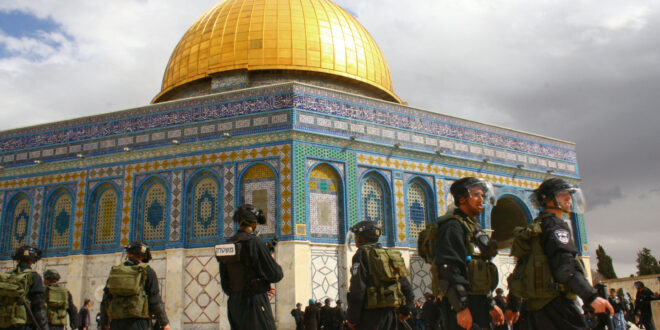On 3 August, Israeli National Security Minister Itamar Ben-Gvir stormed Al-Aqsa Mosque during the Jewish holiday of ‘Tisha B’Av’, joined by 1,250 settlers who conducted religious rituals, raised flags, and sang to rebuild the ‘Third Temple’.
The visit is the far-right minister’s fourth since 7 October 2023. However, his latest comes at a time when Israel faces unprecedented global condemnation over mass starvation in Gaza and plans to take over the Palestinian territory.
Despite the international condemnation he drew for his visit, analysts say that Ben-Gvir’s move emphasises Israel’s determination to rock a fragile status quo in its favour.
For Palestinians, Al-Aqsa has long been a focal point of struggle since Israel’s occupation of East Jerusalem in 1967, and Ben-Gvir’s visit reflects a growing far-right agenda seeking to alter the historic status quo at Muslim holy sites.
Speaking to The New Arab, Sheikh Azzam Al-Khatib, director of Jerusalem’s Islamic Waqf, said Ben-Gvir routinely conducts such “provocative tours” inside Al-Haram Al-Sharif, accompanied by senior Israeli police officers.
“On Sunday, around 100 Israeli security personnel were deployed to secure his movements,” Al-Khatib said.
“These violations have intensified significantly after the war on Gaza,” he added, calling on Palestinians to come to Al-Aqsa and maintain murabita (steadfast presence) to resist efforts to impose a new temporal and spatial division of the mosque.
In June, Britain, Canada, Australia, New Zealand, and Norway imposed sanctions on Ben-Gvir and far-right Israeli Finance Minister Bezalel Smotrich for “inciting extremist violence against Palestinians”.
A push for West Bank annexation
Wasel Abu Yousef, a member of the Palestine Liberation Organisation’s (PLO) Executive Committee, described the situation at the Islamic holy site as “a form of genocide against the Islamic identity of Al-Quds”.
He explained that systematic attempts to Judaise Al-Aqsa, including Ben Gvir’s provocative visits, represent an “effort to erase the Islamic character of the city”.
In light of Gaza’s devastation and rising settler violence in the West Bank, he said: “It’s clear there is a comprehensive war against Palestinians and their holy sites.”
Abu Yousef warned that without global sanctions and boycotts, Al-Aqsa could be lost entirely. The far-right government, he argued, is pursuing a programme to “resolve the conflict” by annexing the West Bank, escalating violence, and committing crimes against Palestinians.
“Arming settlers means bloodshed and war that Palestinians can only confront through resistance,” he said.
Settler armament has surged over the past two years with direct backing from Smotrich and Ben-Gvir.
Many reports, including those by Israeli human rights groups, documented the military’s distribution of rifles and automatic weapons to settlers, forming “armed militias” that have destroyed property, killed Palestinians, and caused the forced displacement of thousands.
According to the National Security Ministry, there were over 403,000 applications submitted for firearms licenses.
Of these, 217,000 received conditional approval and 165,000 resulted in permanent licenses after Hamas’s 7 October attack, with thousands acquiring weapons for the first time.
Abu Yousef said this militarisation – coupled with plans to demolish Al-Aqsa and replace it with the a Jewish Temple – poses an existential threat to Palestinians and their heritage.
Existential threat to Al-Aqsa
“The Israeli political scene is dominated by the religious-nationalist right, with opposition right-wing parties playing only a marginal role,” Imad Abu Awad, a Palestinian journalist and analyst of Israeli affairs, said.
Ben-Gvir’s Al-Aqsa visit is not an isolated incident but “part of coalition agreements with Prime Minister Benjamin Netanyahu aimed at the systematic Judaization of Jerusalem,” he noted.
“What’s happening is more than a raid,” Abu Awad told The New Arab. “This is a clear sign of Israel’s intent to demolish Al-Aqsa, disregarding religious sensitivities and threatening regional security.”
He pointed out that settler incursions have skyrocketed from 3,000 in 2006 to 70,000 annually today, with daily figures sometimes reaching 3,000. Rituals now include full prostration, prayers, and talk of building a synagogue inside the compound.
“They are closer than ever to achieving their goals,” he said, warning that international reactions remain tepid and unlikely to deter Israel’s expansionist ambitions.
Abu Awad added that far-right ideology links control over Jerusalem to a messianic vision extending into parts of Syria and Lebanon. Without stronger global measures, Israel, he warned, “will not stop here”.
Ismat Mansour, an Israeli affairs analyst and former political prisoner, argued that Ben-Gvir’s visit is not mere provocation – it’s a long-term strategy,” he said.
By normalising images of Israelis praying in Al-Aqsa’s courtyards under armed guard, Ben-Gvir is gradually entrenching Israeli sovereignty over the site.
Yet amid the mass killings in Gaza, Mansour noted, Al-Aqsa incursions are drawing less global attention than in the past.
“The focus is on Gaza, and the risks facing Al-Aqsa are being sidelined,” he said, predicting that without meaningful Arab or international pushback, tensions could boil over at any moment.
“There is no real peace process,” Mansour concluded. “What’s happening in the West Bank is a calculated policy driven by the far-right and settler militias, one that could ignite a major confrontation.”
Ben-Gvir’s defiance, he warned, sends a message of impunity that threatens to destabilise the entire region.
 Eurasia Press & News
Eurasia Press & News




